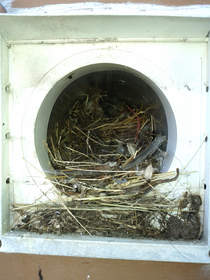LOUISVILLE, KY--(Marketwired - May 19, 2015) - When Keith O'Loane, an experienced Dryer Vent Wizard (DVW) franchise owner and technician, receives service calls in the spring about customers' dryers overheating or not working efficiently, it is not unusual to discover birds' nests clogging the vents.
"A dryer vent makes a convenient nesting place for birds and other critters," said O'Loane. "One time, I pulled a nest almost 10 feet long out of the dryer vent. It was more like a bird condo."
According to O'Loane, one of the first signs of birds or other small animals clogging a dryer vent is when the dryer has been working fine and soon after, it takes items much longer to dry. He recommends that dryer owners check the vent cover outside to look for any bird droppings, pieces of straw sticking out, or discoloration on outside louvers. One of the more telltale signs is a bad odor coming from the dryer.
In one case, O'Loane found no indication of a bird's nest. It wasn't until he removed the vent connection to the dryer that four large dead birds fell out.
"It was a surprise to me and the homeowner," said O'Loane.
Nests can also block air flow with moisture condensing in the dryer vent instead of being vented to the outside, causing standing water inside the vent or dryer that can result in leaks. This not only causes unsightly stains on walls and ceilings but can also result in unwanted mold and mildew in the home.
DVW carries a sanitizer that is recommended for newly cleaned vents to help protect against potential diseases that birds can carry.
When service calls are made to take care of birds' nests, DVW technicians sometimes uncover other serious issues including bad connections behind the dryer and previous lint fires that have occurred inside the dryer -- without the owner's knowledge.
With summer approaching, people who live hot, humid areas may also experience problems with their dryers when the backdraft dampers or vent louvers are not closed properly.
O'Loane, who services customers in southern Indiana and along the Interstate 64 corridor from Louisville to Lexington, warns that condensation of hot humid air can readily occur in the line and into the drum of the dryer, causing the dryer to work less efficiently.
"I've found as much as two to three inches of water in a dryer drum during periods of high humidity," he added. "We make repairs to correct this."
Along with providing cleaning and maintenance services, DVW franchisees and technicians work to educate customers about proper maintenance and regular check-ups and to help raise public awareness about fire prevention and energy savings.
Headquartered in Farmington Hills, Michigan, Dryer Vent Wizard specializes in dryer vent repair, replacement, cleaning and maintenance for residential and commercial customers. A member of the National Fire Protection Association (NFPA), DVW franchise owners serve more than 9,000 communities of all sizes throughout U.S. and Canada. For more information and to learn more about franchise opportunities, visit www.DryerVentWizard.com or call 866-498-SAFE (7233) in the U.S. and 866-395-SAFE (7233) in Canada.
Contact Information:
Media Contacts:
Terry Reuer
Dryer Vent Wizard
586-619-2160, ext. 550
Margaret Blohm, APR
Margaux & Associates, LLC
313-406-3467

